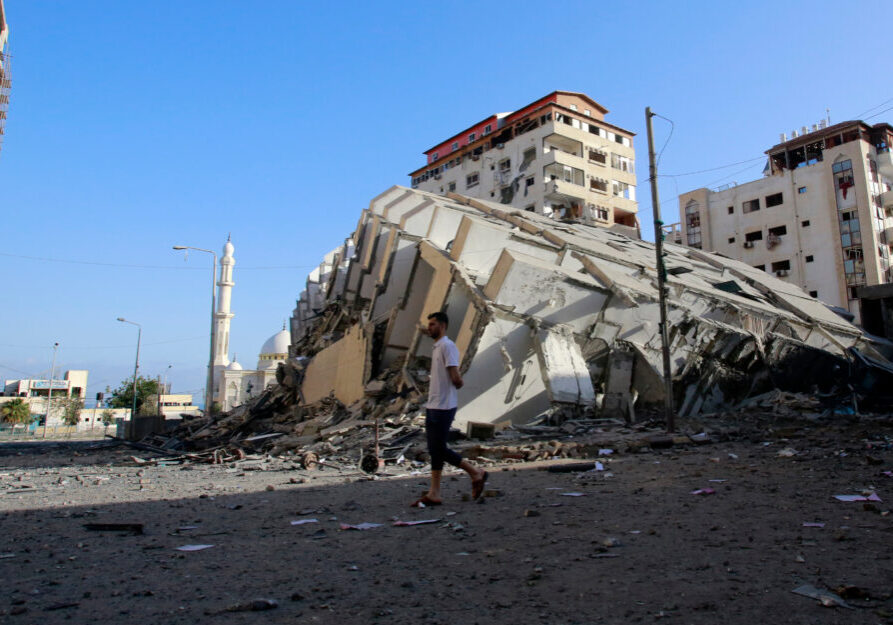Australia/Israel Review
Khamenei vs. Khomeini
Aug 31, 2009 | Ali Reza Eshraghi
By Ali Reza Eshraghi
During his Aug. 3 speech formally endorsing Mahmoud Ahmadinejad, Ayatollah Ali Khamenei warned protesters that “by imitation of Ayatollah Khomeini, they cannot deceive people.” Khamenei was mocking the opposition’s claim to be to reviving “the values of Ayatollah Khomeini” – the founder of the Islamic Republic of Iran and Khamenei’s predecessor as Supreme Leader. Ironically, Khamenei made this statement while seated below a large, framed picture of Khomeini.
This scene provides a stark illustration of the fact that politics in Iran are largely defined by attempts to claim Khomeini’s legacy. Staying faithful to his ideology has been the litmus test for all political activity in the Islamic Republic. Reformists fight for women’s rights, democracy, and civil-military divide – often under the auspices of Khomeini’s pronouncements and writings. And despite the fact that the position of Supreme Leader is supposed to translate into ultimate power in Iran, Khamenei has been severely limited by the traditions and doctrines of his predecessor.
The opposition is thus going straight to the source in their search for legitimacy, accusing Khamenei of disrespecting Khomeini’s legacy and claiming Khomeini’s mantle for itself. The claim is not baseless: Khomeini had actually supported opposition leader Mir Hossein Mousavi against Khamenei on several occasions prior to his death. In 1985, when then-President Khamenei was re-elected president for a second term, he was ordered by Khomeini to keep Mousavi as his prime minister.
But as the regime and the opposition both fight to be Khomeini’s rightful inheritors, the real deciders are Khomeini’s own family members – often referred to as Beit-e-Imam. In Shi’ite tradition, these relatives are considered the guardians and true interpreters of an imam’s thoughts. And in Khomeini’s case, surprisingly, they are disproportionately supporting Mousavi and the opposition.
Khomeini’s son Ahmad was a strong critic of the Iranian regime after his father’s death. Six years after Khamenei became supreme leader, Ahmad made a blunt speech expressing his views; a month later, he passed away suspiciously at age 49. (The official position is that Ahmad’s death was caused by a heart attack, though independent Iranian journalists claim that he was likely assassinated by the Iranian intelligence service.)
Ahmad’s children seem to share his distaste for Khamenei. Hassan, who is the most prominent of Khomeini’s grandchildren and is in charge of his grandfather’s mausoleum, met personally with Mousavi and supported his call to cancel the election results. Hassan also skipped Khamenei’s formal endorsement of Ahmadinejad – widely interpreted as a slight against the Supreme Leader. In February 2008, in an interview with weekly magazine Shahrvand-e-Emrooz (which was later shut down by the government), Hassan spoke out against military interference in politics. Soon after, a publication tied to Ahmadinejad attacked him in an article, “The Secret of Hassan Khomeini’s Red Cheeks,” accusing him of corruption.
Yasser and Ali, Hassan’s two younger brothers, are explicit supporters of the reformist movement in Iran. Yasser frequently attends gatherings of reformist parties such as Mosharekat, Kargozaran, and Sazman-e-Mojahedin. (High-ranking members of these parties are now in prison, accused of initiating a “velvet revolution” in Iran.)
Ali, Hassan’s youngest brother, who is married to the granddaughter of powerful Iraqi cleric Ayatollah Ali Sistani, gave speeches around the country asking people to vote for Mousavi. A part of one speech was censored by Iranian government-run television despite including a quote from his revered grandfather. “The further we get from [my grandfather’s] ideas, the less legitimate the regime becomes,” Ali said on the 20th anniversary of Khomeini’s death, seven days before the June 12 presidential election.
Ali Eshraghi, another of Khomeini’s grandsons, tried to run for the Iranian parliament in 2008 as part of the reformist coalition. His candidacy was denied by the Guardian Council, which is under Khamenei’s control. In an interview with the Associated Press, Eshraghi called the council’s decision an insult to the Khomeini family.
Zahra Mostafavi, Khomeini’s most prominent daughter, is the secretary-general of a women’s rights party. (Mousavi’s wife is also a member of the central committee of the party.) Mostafavi also supported Mousavi in the recent election with an official endorsement. Zahra Eshraghi, Khomeini’s most prominent granddaughter, is married to former President Muhammed Khatami’s brother, who was the secretary-general of the reformist Mosharekat party. In an interview on February 2008, she objected to the boycott of her family in government-run radio and television: “[The regime is] threatening our family in very different ways,” she said. “Their purpose is to eliminate Khomeini’s name, his family and his true friends.” Eshraghi and her husband are open supporters of Mousavi and have officially endorsed him through their party; both were arrested a day after the election. In another interview ten days before the election, Zahra said, “Mousavi was one of the very few people trusted by my grandfather.”
The family has even been outspoken in directly challenging Khamenei’s attempts to appropriate Khomeini’s legacy. In an effort to justify Khamenei’s support of the allegedly fraudulent elections, the government-run Islamic Republic News Agency published an article stating that Khomeini had once approved an election despite evidence of fraud. This claim was soon rebuffed by the director of the Institute for the Compilation and Publication of Imam Khomeini’s Works, which is run by Khomeini’s family.
It is becoming so difficult for the regime to claim Khomeini’s mantle that, in what may be the first time in the regime’s history, they are trying to legitimise Khamenei’s actions even if they run contrary to Khomeini’s teachings. In an interview on July 27, Ali Saeedi, Khamenei’s representative in the Iranian Revolutionary Guard Corps, stated that everyone “should obey the living Supreme Leader. Some people are sticking to Imam Khomeini’s ideas; they should know that His Majesty [Ayatollah Khamenei] has run the country for the last 20 years. The situation has changed. Threats and conspiracies against us have changed.”
On the 20th anniversary of his reign as Supreme Leader, Khamenei is finally testing the boundaries of Khomeini’s influence. It’s a risky gamble – but he seems to have little choice, given his dwindling support among Khomeini’s descendants. The move away from Khomeini gives the opposition powerful ammunition against him. And pushed to choose between Khomeini and Khamenei, many Iranians will continue to follow the Islamic Republic’s founder – and those they see to be his true heirs.
Ali Reza Eshraghi, a former newspaper editor in Iran, is a visiting scholar at the University of California, Berkeley, Institute of International Studies. © The New Republic, reprinted by permission, all rights reserved.
Tags: Iran






